How to Sleep Better (Well) at Night (Ancient & Modern Research Based Concepts) | How to sleep better (faster) at night naturally | How to sleep peacefully without thinking (worries) (tips) | How to sleep through the night without waking up | How to have a good night’s sleep (without distractions)
Hello friends, how are you doing today? Welcome to #Relationships-Parenting website / blog.
Let you and your well-wishers live a happy and prosperous life through out your life term.
In this website / blog, you will always learn about #Relationships #Parenting.
Also subscribe / follow to our various social media networks from here to learn more about #Relationships #Parenting:
Just before going to “How to Sleep Better (Well) at Night (Using Ancient & Modern Research Based Concepts) | How to sleep better (faster) at night naturally | How to sleep peacefully without thinking (worries) (tips) | How to sleep through the night without waking up | How to have a good night’s sleep (without distractions)“, let us know a brief, basic and very important information.
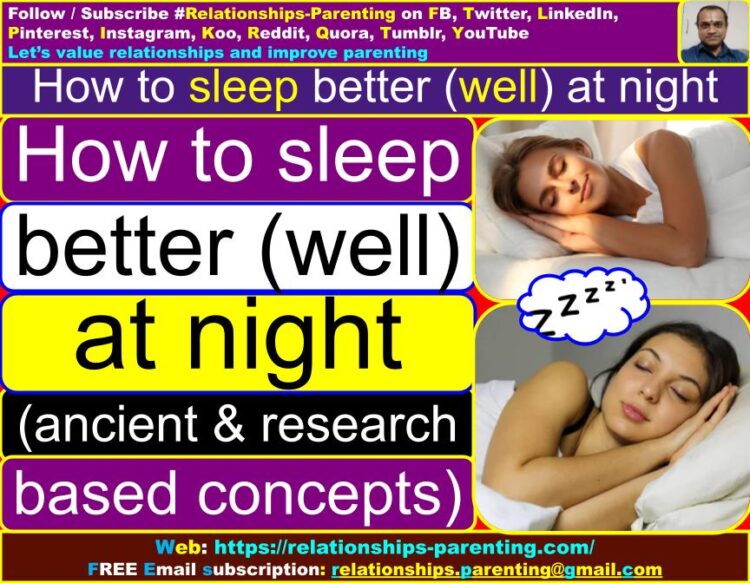
What is sleep : Sleep is a state of reduced mental and physical activity in which consciousness may or may not be altered,
and sensory activity may or may not be inhibited to a greater or lesser extent depending on the individual’s mental and physical health.
Why do humans need sleep : During sleep, the human body works to support healthy brain function and also maintain good physical health. That is, sleep is very much necessary for both mental and physical balance.
In children and adolescents (teens), sleep helps support mental and physical growth and development. Getting inadequate sleep over time can increase the risk of long-term (chronic) health problems.
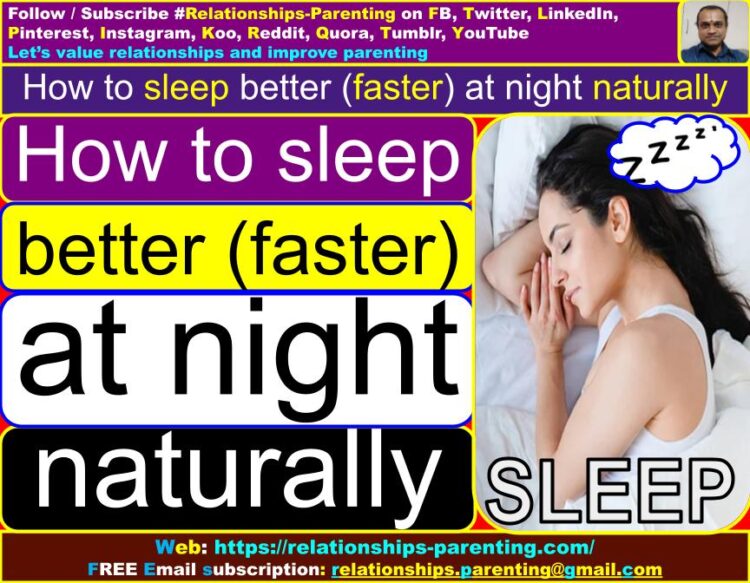
Few of the commonly asked questions regarding this subject is as given below:
How to sleep better at night naturally | How to sleep better at night | How to sleep better and faster | How can I sleep super fast? | How to sleep peacefully without thinking |
How to sleep fast in 5 minutes | How to sleep instantly | How to sleep through the night without waking up | Sleeping tips | And many more…
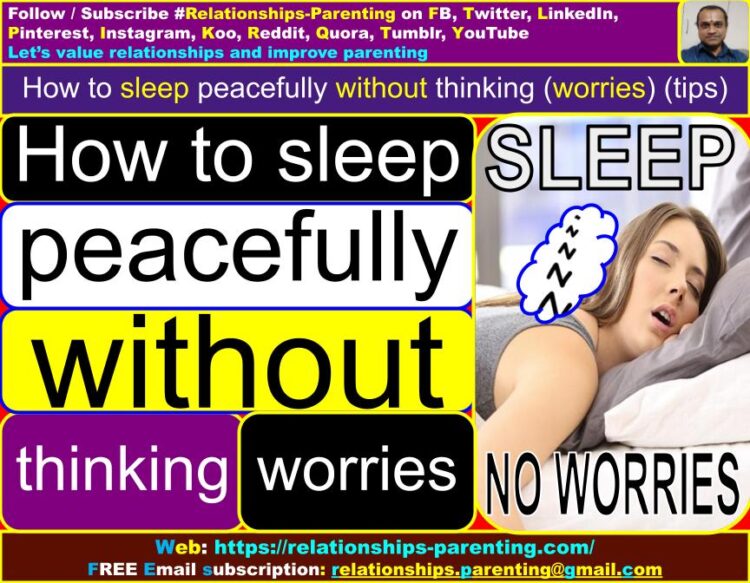
Modern day hectic lifestyle, household problems, office stress etc. have made peaceful human sleep a rarity for most of the people. For many people around the world getting a good night’s sleep is one of the most important things one can do for one’s overall health and well-being.
We are ignoring the laws of nature regarding sleep and not following the words of ancient people, is the root cause of the problem of not getting peaceful sleep in many.
If you’re having trouble in getting a good night’s sleep, you might be getting all kinds of different advice on how to solve the problem from different people around you.
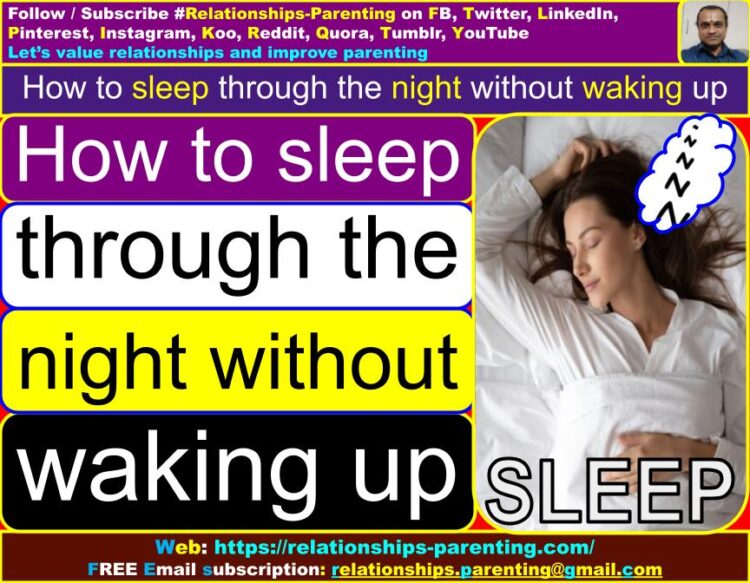
In this post (article) you will get ancient and modern research based concepts to know about the preparations to be done before going to bed to get a peaceful sleep through the night.
We have conducted various researches for you and have gathered all the most reliable and valuable tips for your best sleep, including expert recommendations.
This post (article) also explains ancient methods of getting good and sound sleep with simple understanding and concepts.
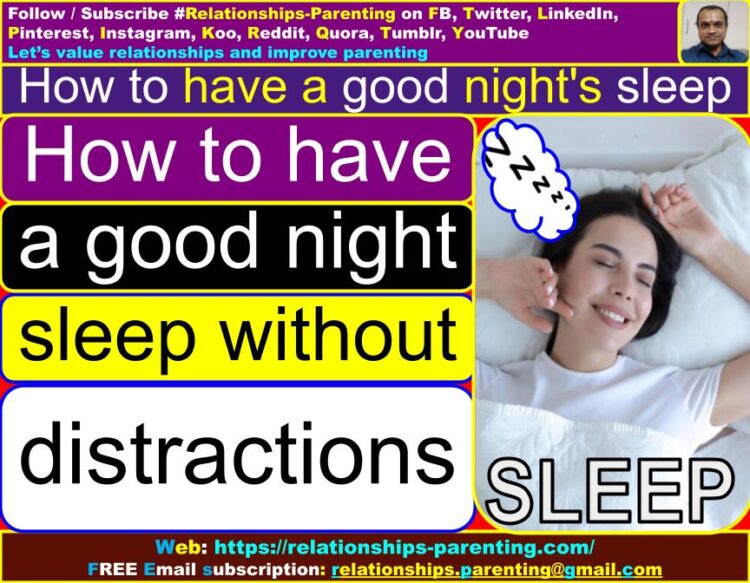
List of ways about “How to sleep better (well) at night | How to sleep peacefully without thinking | How to have a good night’s sleep etc.” is as given below:
Drink two or three sip of water before going to bed : Ancient studies and modern research have shown that dehydration can make people feel cold or hot during sleep.
Drinking a small amount of water before bed can benefit you by ensuring you are well hydrated while you sleep and also maintain an optimal body temperature. This helps ensure that your sleep remains undisturbed and continues comfortably throughout the night.
While some people worry that drinking water can negatively affect our sleep, whereas ancient and modern studies on the other hand show that staying hydrated can help you sleep better, which in turn improves your health too.
However, try to avoid drinking large amounts of water before going to bed, as this may cause you to wake up to urinate and disturb your sleep.

Keep your body clean and dry : While going to bed, it is advised to keep the whole body clean and dry. If the body is wet, it will irritate you and you will not be able to sleep properly.
If the body, especially the feet, is wet, the waves inside our feet are absorbed by the whole body and due to their subsequent movement within the body, the body is filled with negative and unwanted waves.
These waves flowing from the feet are absorbed into the body and all its membranes. Water makes the body more sensitive and the membranes inside the body become active. Water is all encompassing, and thus it responds to both positive and negative vibrations equally.
Since a person is connected to the ground while lying down, the disturbed waves emanating from the ground are immediately attracted to the wet body of the person and spread to the internal membranes of the body.
This increases the amount of negative elements in its membrane. It makes the person irritable and experiences nightmares, screams in sleep, restlessness throughout the night etc.
Hence it is recommended to wipe and dry your feet before going to bed. A dry body can accumulate positive waves. Hence, the possibility of being attacked by negative forces is relatively less.
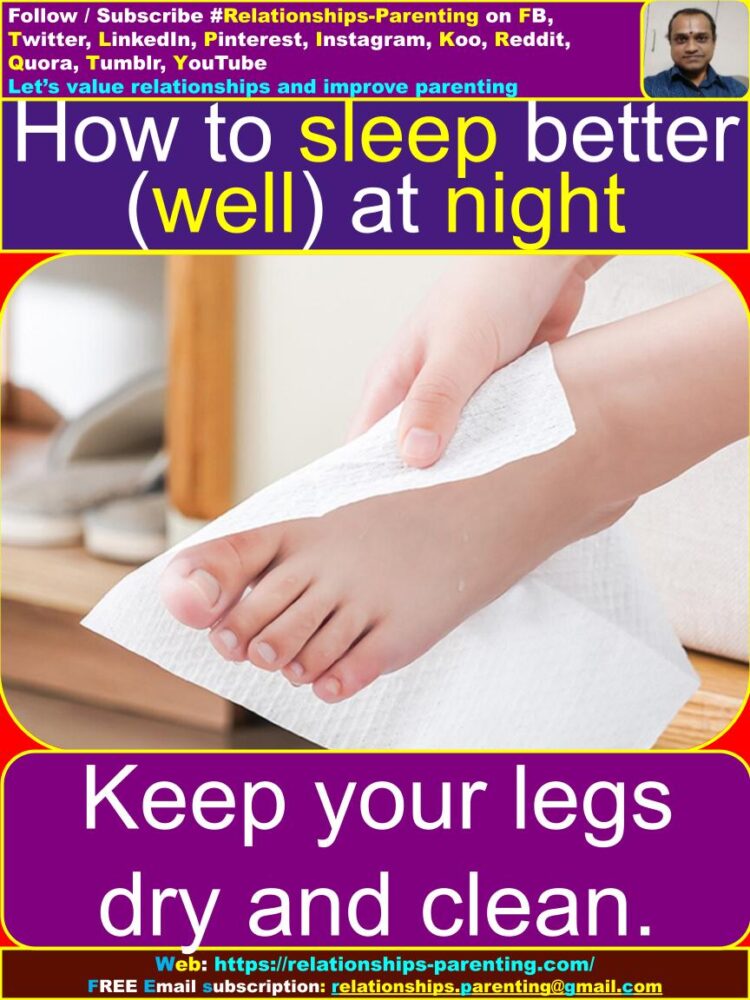
Get shower in the evening : Bathing in the evening is always a good and positive habit. Research lends credence to the effect of warm baths.
A meta-analysis of 17 studies found that taking an evening shower or bath between 104 and 108.5 degrees Fahrenheit improved sleep quality.
People who shower or bathe one to two hours before bedtime also fall asleep faster. Researchers theorize that warm water stimulates blood flow to the hands and feet, allowing body heat to escape more quickly.
A recent study of older adults found that taking a warm bath one to three hours before bedtime helped them fall asleep faster.
Some people take a hot shower before bed when they feel a cold, as inhaling warm steam is a popular home remedy used to reduce nasal congestion. Current evidence does not support the benefits of steam for nasal congestion, but you may try this method to find relief.

Use a pillow that fits you : A comfortable and suitable pillow is recommended for sleeping. Some like a hard pillow, some like a soft one, and some like a mix of hard and soft pillow.
When sleeping on your back or side, your pillow should rest under your head and neck but not your shoulders. A good thumb rule says that your pillow should always keep your neck parallel to your bed, no matter what position you’re in.
Different types of pillows available in market are: Down Pillow, Down Alternative Pillow, Feather Pillow, Cotton Pillow, Latex Pillow, Memory Foam Pillow, Shredded Memory Foam Pillow, Bamboo Pillow, Gel Pillow, Polyester Pillow, Buckwheat Pillow, Microbead Pillow, etc.
As people are unique and have different choices, preferences, options and likes, you are the best judge of the right pillow for you. According to ancient traditions, the best direction to sleep is south.
This theory is also supported by some recent and modern researches. This means that when you lie in bed, your head points south and your feet point north.

Follow a sleep schedule : If we want to be at our peak, we need to follow a proper schedule. Whether it’s going to school or completing an official project, a schedule is always needed. Sleep needs can vary from person to person.
But in general, experts recommend that healthy adults needs an average of 6 to 8 hours a night. If you need more than 8 or 9 hours of sleep each night to rest, this may be a sign of an underlying problem.
Set aside eight hours (maximum duration) for sleep. The recommended amount of sleep for healthy adults varies from 6 to 8 hours.
Most people don’t need more than eight hours in bed to feel well rested. Go to bed and get up at the same time every day, including weekends.
Staying consistent helps your body’s sleep-wake cycle. School-aged children should go to bed between 8:00 and 9:00 p.m. Teenagers should try to sleep between 9:00 PM and 10:00 PM. Adults should try to go to bed by 10:00 p.m.

Minimize the light exposure an hour before bed : As a recommended and general rule, it is best to sleep in the dark as much as possible. Pitch darkness minimizes potential distractions and sleep disturbances.
Sleeping in the light disrupts sleep cycles and leads to more fragmented sleep, and these negative effects can increase within hours of waking. Absence of light sends a signal to the body that it is time to rest.
Exposure to light keeps your mind and body awake, and even at night, it disrupts your body’s circadian rhythm. Researchers have found that even small amounts of light can disrupt sleep.
Light directly enters your eyes and causes obstruction and therefore you need to reduce the light as much as possible.
To avoid sleep-related health problems, people should take simple precautions like this: Don’t leave the TV set ON overnight while you sleep. Turn it OFF and sleep in a completely dark room. A study suggests that sleeping in the dark can lower your risk of heart disease and diabetes.
Exposure to overhead lighting during sleep at night, compared to sleeping in a dimly lit room, harms heart function during sleep and affects how the body responds to insulin the next morning, researchers found.

Over eating won’t help you to sleep-well : Eat as much as your stomach asks and not according to the taste of your tongue. Listen to your stomach and not your tongue for food.
Give importance to what and how much you eat and drink. Don’t go to bed hungry or over stuffed. Always remember, avoid heavy or large meals within a couple of hours of bedtime.
Binge eating disorder can keep you awake for long periods of time. Similarly, eating less can harm your restful sleep. As said, eat how much your stomach need and not your tongue.
Nicotine, caffeine and alcohol also deserve caution. The stimulant effects of nicotine and caffeine take hours to wear off and can disrupt your sleep.
And while alcohol may make you sleepy at first, it can disrupt sleep later in the night. All these are recommended to be avoided to get a peaceful and undisturbed sleep.
Some of the best foods for a good night’s sleep are: whole grain bread, pasta, crackers and brown rice, peanut butter and nuts like walnuts, almonds, cashews and pistachios.
So are spinach, nuts, seeds, avocados and black beans. Drinks include: warm milk and herbal teas such as chamomile or peppermint.
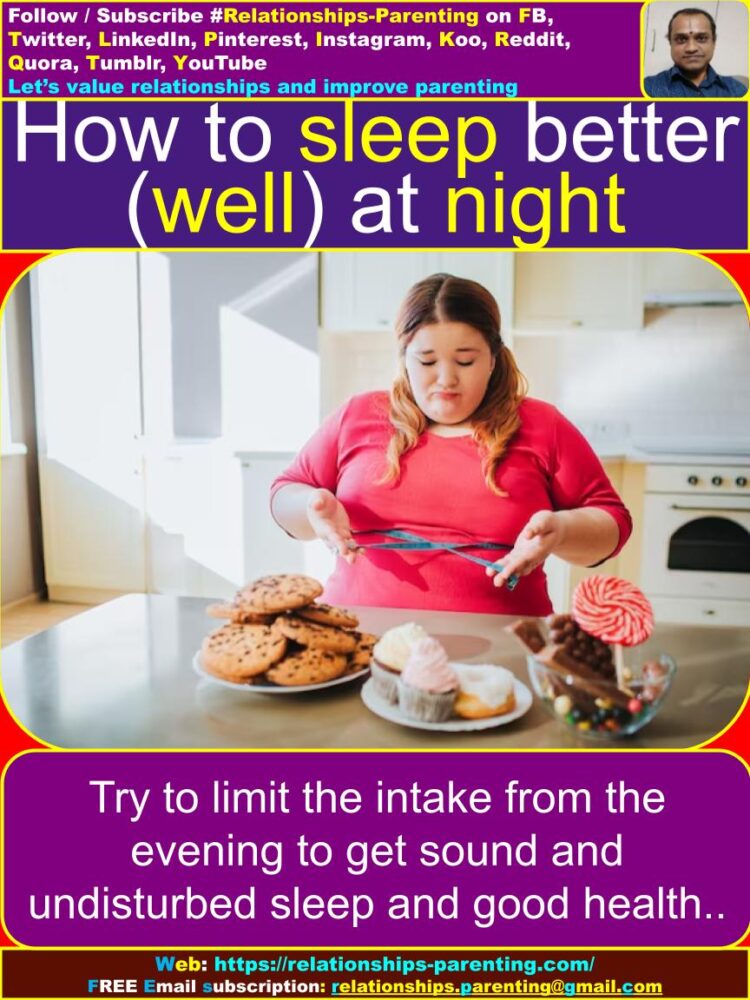
Listen to your favorite and soothing music : Researchers say that gentle music improves sleep by slowing your heart rate and breathing, and lowering your blood pressure.
It helps in reducing your stress and anxiety levels too. According to studies, slow music and / or classical music is more relaxing which can help you feel more comfortable and sleep through the night.
Slow music and / or classical music is more relaxing and will help you sleep. Classical music or instrumental music can help slow the heart rate and reduce levels of stress hormones.
On the other hand, noisy music should be completely avoided. Exposure to too much noise during sleep can have immediate effects while we sleep, which can lead to short-term problems the next day and long-term psychological and physical effects over time.
Several studies suggest that soft music promotes good sleep due to its effects on the regulation of hormones, including the stress hormone cortisol.
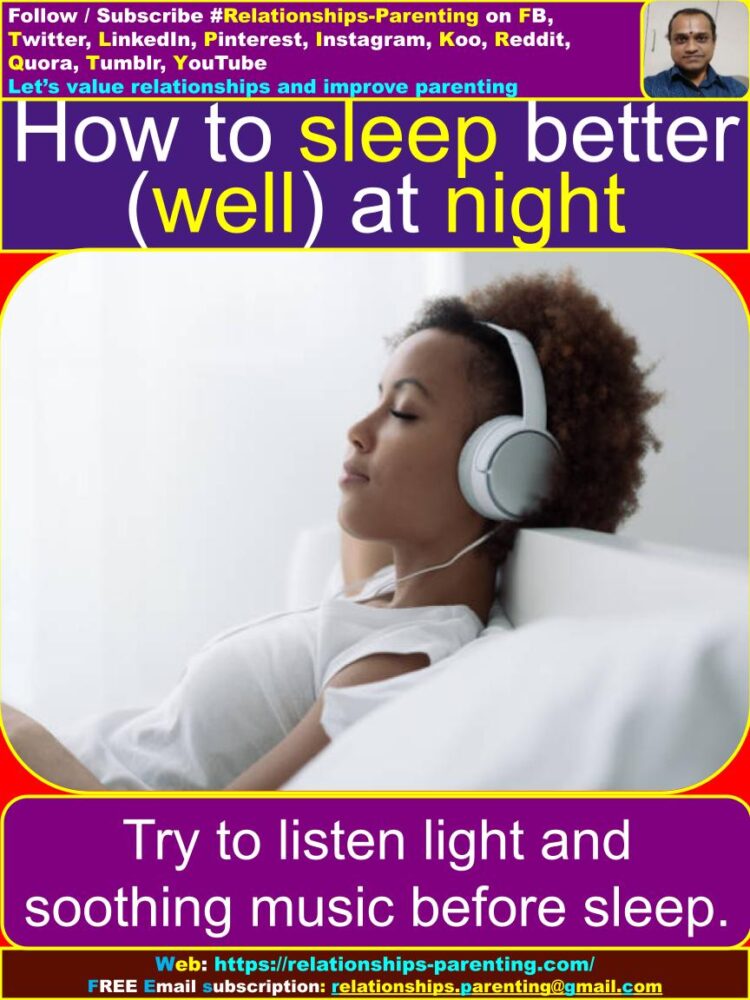
Limit or completely avoid daytime naps : Long naps during the day time can disrupt your sleep at night. It is better to limit taking naps during the day. It is recommended to have just one nap after lunch for about 30 minutes a day.
Conversely, the habit of taking frequent and long naps during day time is associated with greater morbidity and mortality, particularly in the elderly.
Napping during the day can make you more sleepy and confused after waking up from an afternoon nap. Thus, it spoils your mood. The primary concern is that long afternoon naps have more disadvantages than benefits.
Staying awake all night and sleeping all day for a few days disrupts the levels and diurnal patterns of more than 100 proteins in the blood, including those that influence blood sugar, energy metabolism and immune function, the study says.
However, if you work at night shifts, you may need to sleep late the day before work to help make up your sleep debt.

Be physically active during the day : Include physical activity in your daily routine. Regular physical activity promotes better sleep. However, avoid being active close to bedtime.
Apart from your 30-60 minutes of exercise, spending time in the sunlight every day can help you sleep better at night. Physical activity helps in better blood flow in your body and subsequently you get better sleep at night.
Aside from getting better sleep, being physically active can improve your brain health, help you manage weight, reduce your risk of disease, strengthen your bones and muscles, and improve your ability to perform everyday activities.
Adults (40+) who sit less and do any amount of moderate-to-vigorous physical activity reap some health benefits. The more physically active you are, the better you sleep at night.
This does not mean that you have to be physically active all the time. But it is recommended to be physically active so that you have an active and healthy lifestyle.

Keep your bed clean and tidy : Cleaning removes dirt and dust as well as germs and bacteria, thereby providing better indoor air quality with freshness in your home.
Keeping your bed clean is an important step in ensuring a good night’s sleep and reducing your risk of exposure to allergens and bacteria living in your bed or sheets.
Proper hygiene is important in all walks of life. When it comes to our bedding, it’s probably more important than you think. Without regular cleaning, dirty sheets can lead to allergies, skin breakouts, asthma and more.
To keep your bed really fresh, throw back your bed covers for 20 minutes every morning in the sunlight to allow your bed to air and allow body moisture to evaporate.
Make sure you dust and hoover around your bed every day and open as many windows as possible to let stuffy air and fresh air flow into your home and bedroom.
If you don’t clean your mattress regularly, dead skin cells, sweat, saliva and more can turn your comfortable mattress into a petri dish for microbial growth.
For example, lab tests found that swabs from pillowcases that hadn’t been washed for a week had 17,000 times more bacterial colonies than samples taken from the toilet seat.

Avoid all electronic devices 1 hour before bed : Yes, life is difficult in today’s world without mobile phones and other electronic devices.
But that itself is not life. Many studies say that you should stop using electronic devices like your cellphone at least 60 minutes before bedtime. Instead, you should grab a book placed on your nightstand and start reading before bed.
Your phone’s vibrations do more than wake you up, and electromagnetic radiation affects your brain activity and is harmful to your body especially to heart and brain.
Furthermore, using a phone close to you before going to sleep will fork the overall effect and should be kept far away if not switched off.
If you must keep any of these devices in your bedroom, then use the Do Not Disturb function or turn them to silent or completely off so that you are not tempted to look at their screens if you wake up in the night.
Keep your cell phone at least 4 – 5 feet away from your bed to limit radio frequency exposure. It is better to turn-off your cell phone before you go to bed (unless you rely on your phone’s alarm clock).

Keep a copper tumbler near your head : It is an ancient method to ward off all the negative energies from us and to gather all the positive energies around us.
Placing a metal tumbler, especially a cooper tumbler filled with normal water next to the head protects your body from the attack of negative energies and its underlying process.
According to science, water is the most sensitive medium. It is all-encompassing, i.e., it is highly efficient in absorbing and emitting matter and non-matter waves in equal measure.
Therefore, placing a metal pot (preferably copper) filled with ordinary water next to the head can protect your body from all negative energies very easily.
Proponents of the new health fad claim that drinking water from a copper cup or mug can reduce inflammation, aid in thyroid function, regulate blood pressure and promote weight loss.
(To get the maximum benefit, we need to store the normal water in the copper vessel for at least 8 hours before we drink it.)
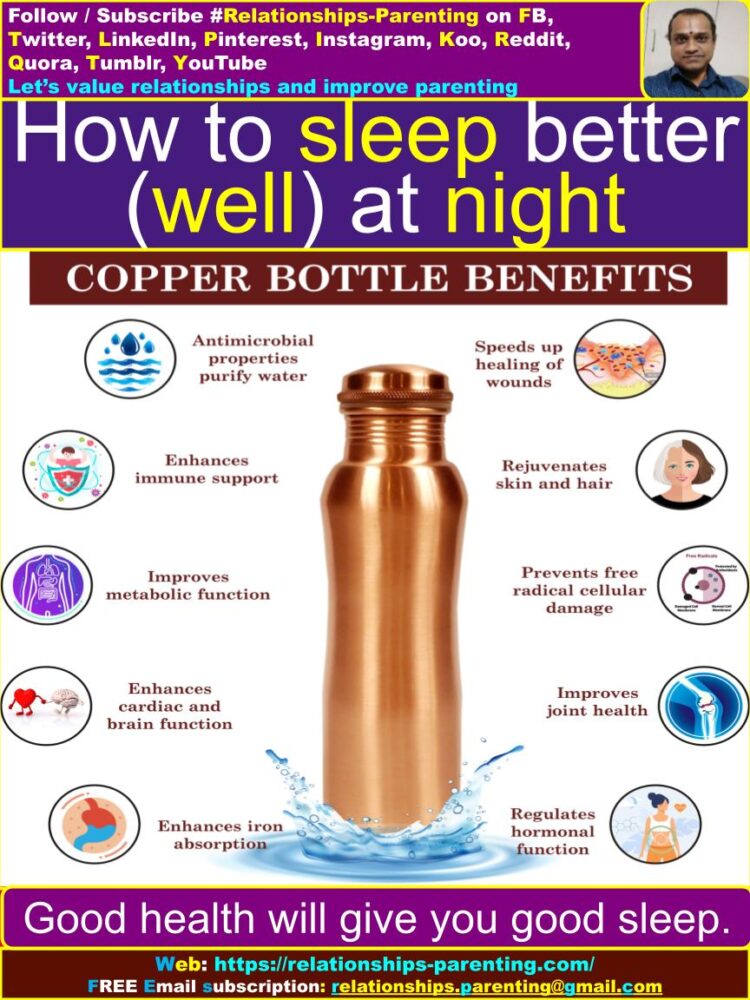
More information will be added to this on regular basis. Please visit this post and blog / website to know more about relationship and parenting.
Continue reading about:
To know more about “Husband and wife information, facts“, please click the below link:
Husband and wife information, facts
Dear friends, if you need any clarifications about this post, kindly let me know, I will definitely try to answer all of them.
Also add your COMMENT below, SHARE on different SOCIAL MEDIA networks.
This will help to know the quality of this content and also it will be helpful to know if any improvements is required for the content.
If you feel this content is useful to you and has helped you to improve your knowledge, kindly share this with your well-wishers.
Because “SHARING MEANS CARING”.
To receive FREE EMAIL SUBSCRIPTION about #Relationship #Parenting, you can send an email to [email protected] from your email ID.
Let you and your well-wishers live a prosperous, healthy and fearless life through out your life term.